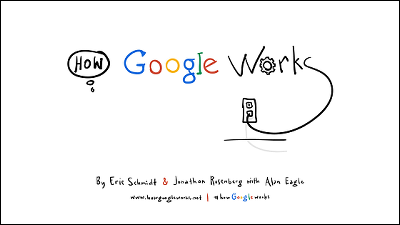"Energy is infected" "Meeting people who produce ideas" Google's former CEO Eric Schmidt talks about "new ways of working"

Google former CEOEric SchmidtMr. Jonathan Rosenberg, an advisor of Mr. Larry Page and Mr. Larry Page, fully disclosed the "new management method" Google is doing is "How Google Works (How - Google Works) - Our way of working and management"is. Mr. Schmidt came to Japan to celebrate the publication of the new work on Tuesday, November 4, 2014, and the former Google Japan corporate representative directorKenro MurakamiWe talked with Mr. and "What is Google's Successful Method" talk event.
Nikkei Electronic Special Forum held | Google CEO Eric Schmidt's management and its philosophy, "How Google Works"
http://pr.nikkei.com/campaign_event/201411_hgw_es/
Arrived at Belsall Shiodome.

The hall is the first floor of the basement, so we will escalate down.
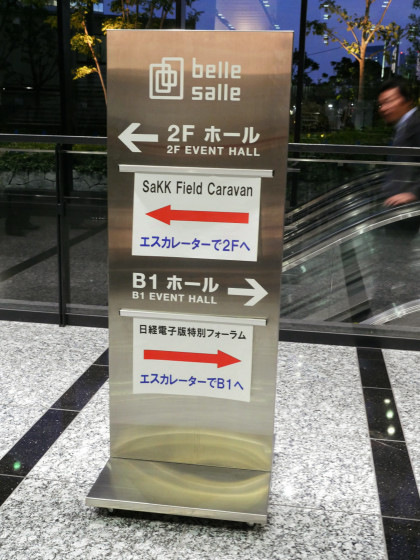
In the vicinity of the venue "How Google Works (How - Google Works) - Our way of working and management"Was also on sale.
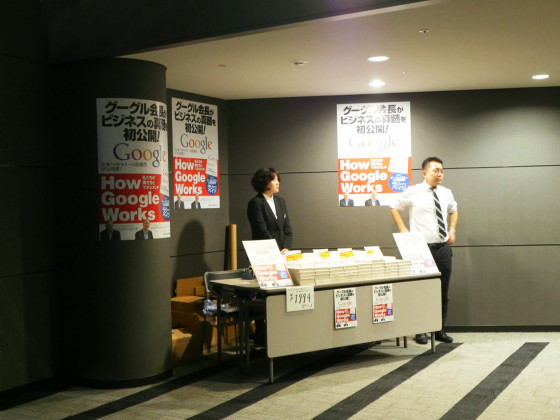
This is reception.
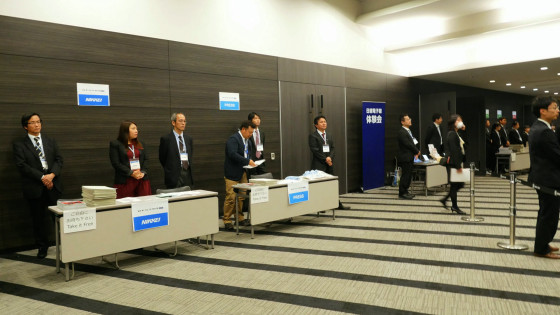
The event started at 18 o'clock, and the reception started at 17 o'clock, arriving at 17 o'clock. There are still few people.

On the screen in front of the venue the letters "The future of the Internet and how we work" are listed.

As the event started approaching, people grew more and more.

That's why Eric Schmidt and others are on the stage and the event starts.

From left: Mr. Kenhiko Koyanagi, Mr. Google Yuan CEO · Erik Schmidt, Mr. Kenro Murakami, former Google president of Google.

Moderator · Koyanohiko Koyanagi (hereinafter Koyanagi Koyanagi):
Three common languages are English, so from now on we will talk in English. First of all, I would like to tell you what each is doing now. Eric is working as an executive chairman, but what kind of thing?

Google former CEO Eric Schmidt (Eric Schmidt):
First of all, thank you for setting up such a place. I am glad to see you again because I have been with Mr. Murakami since we launched a Google Japan corporation. I have been working as a CEO for ten years but now I am in charge of foreign negotiations with the government.
Google Google pre-president · Kenro Murakami (hereinafter Kenro Murakami):
I retired from Google three years ago and now I am a lecturer at the university. Also, I have created a company by myself, and I am helping Japanese government and municipalities.
Koyanagi Koyanagi
Both of them are engaged in big things. Today I would like to talk about books, but those who have read books already have hands ... ... quite a lot. So, today we will talk about the assumption that everyone read a book.
Eric took office as CEO and first he asked me to write a business plan. It's about the summer of 2003. What actually was made is that there were no financial plans, goals, budget and milestones, unlike regular business plans. How did you see the business plan at that time?
Eric Schmidt:
I think that there are many people who received classical business training at this place, but the only thing we must write in this book is "to make great products." Thanks to the Internet and globalization many things have been made possible. Trust me, if there are excellent products, customers will also be accompanied by money. Anyway it is necessary to make a great product. I used Microsoft's codename "Finland" in the book, but the real codename is "Canada". Because it is in the north (haha). In addition to "making great products", the strategy we have always stated was to make Canada, that is, Microsoft replace Google.
Money can be collected if the product is excellent. Although there is no sales in the Internet world, there are many companies that are collecting money because of their valuation.

Koyanagi Koyanagi
How did you tell the "How much profit do you earn" at the Board of Directors?
Eric Schmidt:
I focused on products, not money. Since Google is not a manufacturing industry, you can operate it with excellent engineers and data centers.
Koyanagi Koyanagi
So at that point you could hire an excellent engineer.
Eric Schmidt:
That's right. And another decision we took earlier was to make a decision to "make 50% of the company an engineer". This is unheard of. Normally about 20% are engineers, 40% are sales and marketing. However, in order to concentrate on the product, we decided to narrow down the number of sales and take more engineers.
Koyanagi Koyanagi
Even in Japan, did not you have to issue a budget value or a company forecast?
Ken Murakami:
Basically it is. In 2003 I entered Google, but at that time there were rules or something like OKR (Objective and Key Result / main goal). We basically focused on our customers and we thought that the results would come later. The goal as OKR that I set up in the first year was not sales, but I showed it at the penetration rate of "How long will Google's service become known to Japanese users in a year?"

Koyanagi Koyanagi
Did not you talk about money?
Ken Murakami:
Of course, I had to think about money as a representative, but that was not the first OKR.
Eric Schmidt:
OKR (Objective and Key Result / goal and main result) was originally made in Intel, and it is used also by Google. It says that not a 10% improvement in the book, but a 10 times improvement should be asked. It may seem impossible to be 10 times, but if you set the goal, the team may make 3 times better things. By stepping up serious things you step up greatly. Companies in Japan may be focusing on stacking little by little, but Google does not do that kind of way. It may seem like a crazy idea, but even if it fails it aims for great progress.
Koyanagi Koyanagi
Even though it does not matter how much money you need money to operate the company. When you buy something, do you pay in a form like advance payment and settle it later? Or do you need approval to purchase things?

Eric Schmidt:
Suddenly there was a red telephone being delivered to the company. What is to say is that Larry and Sergei handed credit cards to certain people and said, "Get some interesting things". With that kind of feeling, there are restrictions, but you are mostly purchasing things freely.
Koyanagi Koyanagi
About corporate acquisitions?
Eric Schmidt:
It is a similar thing. Even when I acquired a company that made Google Earth, Sergei suddenly said in past tense that "I bought a company." When asked, "How much did you put out?" He answered, "I do not care, such a thing." But now Google Maps is born from Google Earth and 1 billion people use it.
At another time, Sergei said, "There is a wonderful idea on advertisement so we need money for the team." At the outset I objected, but eventually I told that "if it is 1 million dollars (about 110 million yen) it is possible." Then he used 2 million dollars (about 230 million yen). I was angry then, but now his idea at that time, adsense, is making $ 10 billion of profit. I was wrong.

Koyanagi Koyanagi
Have you never made a budget in the past?
Eric Schmidt:
No, sometimes I will obey my budget. But it does not always obey.
Koyanagi Koyanagi
Is there a budget division?
Eric Schmidt:
Yes.
Koyanagi Koyanagi
Then, there is a person like a gatekeeing?
Eric Schmidt:
I always check if it is legitimate. Since Google has both cultural differences with both Japanese companies and existing American companies, we need an environment that allows creative people to work freely while doing existing management such as budget.
Koyanagi Koyanagi
Next is the talk of how to bundle smart creatives.
Eric Schmidt:
The word "smart creative" frequently appears in books. They are people who graduated from a very high-level university. Of course, some people graduated from a high-level university both in Japan and the United States, but many enter into large companies with a dull movement. Smart creatives often gain experience in such large companies, start off the company and start up. We have called "smart creative" those who have such two elements as "to start a business" and "to have curiosity". They also make mistakes, but they can pay a big victory. So, you need to gather a lot of smart creatives in the company.
There is also a strong type called Diva. "I am right, you are wrong" type. But they are people who push up the organization. In the top down, new things can not be born. It is exactly the structure of Google's organization to move the whole company more and more from the bottom as a team.

Ken Murakami:
Google's corporate policy is what an engineer's smart creative made. They brought Google's fundamental corporate culture even when creating a Japanese corporation.
Koyanagi Koyanagi
In books, the best way to utilize smart creatives is basically saying "giving freedom". I think that smart creatives will do what they like and what they want to do, but how do you grasp progress confirmation?

Eric Schmidt:
There are two ways. One is to set up an opportunity to announce 'What you are doing' every week. Also, it is doing to write "what you are doing" on one line to the computer. At one point, "The management team does not necessarily say anything really true," as Larry said, "I understand why?" I heard that all the rallies reading a snippet of writing are reading It was. At this time, I felt that management itself was unnecessary.
Ken Murakami:
I was told that "I should become a supervisor of an adult" in an interview when I am hired. It was sought to prepare a pleasant environment and pay attention. However, when I showed Kyoto to Howard of smart creative, I did not allow time when I was excited and told that "R & D center should be in Kyoto".

Koyanagi Koyanagi
It is very interesting. Does not the reporting meeting and the like regularly open?
Eric Schmidt:
There was a 60 - minute meeting that prohibited bringing in PCs in the past. It was rude to talk while watching the monitor, so we had to talk face to face. But that attempt failed and I can bring it now.
Koyanagi Koyanagi
When I made a business unit I was touched in the book that I concentrate on my business only and will not work for my company.
Eric Schmidt:
At Sun Microsystems, because of the business unit, internal competition for each department occurred. At that time, I decided not to work in such a company again. Companies should not be divided by department, and employees should work for "one company".
Koyanagi Koyanagi
Last week Google reorganized the entire group and in one newspaper said that Larry Page came closer to a larger company than before. I thought that I read it and classified it on a business unit basis, but do you think that classification is necessary when it comes to a certain scale?
Eric Schmidt:
I think that there is some. But not everything will be a distinct separate section.

Koyanagi Koyanagi
I will ask about adoption. Hiring is the most important and difficult task for managers. It takes time to interview thousands of people, and there is a limit to the time the manager can spare. How did you manage it?
Eric Schmidt:
I did various experiments. I even interviewed one person 16 times in the past. Besides, we did not adopt interview for 16 hours. As a result of conducting research on interviews, we found that it is possible to predict whether employees will be hired in statistically approximately five times, so we currently have limited interviews with approximately 5 times and up to 8 times I will. Also, in previous companies, managers hired other companies' friends, but we did not admit that, we always made a review by top management to recruit.
Koyanagi Koyanagi
The CEO will always be a member of the recruitment committee, is not it?
Eric Schmidt:
That's right. As a result, the CEO reviewed all offers every Monday using an hour.
And what matters most about recruitment is to suppress recruitment of "assistants" in Japan and the United States and to recruit more people from the core.
Koyanagi Koyanagi
I see. But, if you still need an assistant, is your assistant also smart creative?
Eric Schmidt:
You should adopt a person with as good a quality as possible.

Koyanagi Koyanagi
Does that mean that smart creatives do simple tasks?
Eric Schmidt:
Rather, there should not be an easy job. If there is easy work, I think that it would be better to replace it with something or automate it.
Koyanagi Koyanagi
I understand. Next question. In the organization 20% of people work 80% of the workPareto's lawIs there something like that, can Google see Pareto's law, too?
Eric Schmidt:
This is led by Italian economist Wilfredo Pareto, but it is possible to make an organization so that Pareto's law does not work. Google does not hire such people from the beginning. Nonetheless, if there are human beings who do not do so well, we will use the power of corporate culture. I ask the colleagues to put pressure on me.

Koyanagi Koyanagi
Are you going to dismiss?
Eric Schmidt:
It is very rare, but it is. Sometimes, some people go out of their own. However, it is not the individual's fault that the performance of the employees is not good, most of the company's faults.
Koyanagi Koyanagi
Sometimes I'm going to dismiss, how do you do it?
Eric Schmidt:
I will talk to employees. Japan is a lifetime employment, but we can not imagine such a thing in us. Occasionally employees leave the company, but I am proud that our employees keep high quality.

Koyanagi Koyanagi
Although smart creatives bring great results, those who bring out great results need to be compensated accordingly. What kind of evaluation system is used for compensation?
Eric Schmidt:
We rank employees and talk for about half a year intervals. As colleagues in the team know who is smart, hardworking, or needing improvement, that team colleague knows, so we will investigate them. And the evaluation is not individuals, the team decides to approve. For that reason, I will approve not only myself, but also rally and Sergei.
Koyanagi Koyanagi
Is the final decision at the committee?
Eric Schmidt:
That's right. A promotion committee is formed in the community of colleagues. Therefore, even if there is a proposal from the CEO, promotion is impossible if it is refused from that community. Something like colleague pressure is working well.

Ken Murakami:
It is almost the same in Japan, and above certain levels, there are proposals for promotion from the above people and colleagues. And it is the mechanism that the community on that will examine it.
Koyanagi Koyanagi
It is multifaceted evaluation.
Eric Schmidt:
I call it a 360 degree review. Boss, colleagues review, people in the first class give final evaluation.

Koyanagi Koyanagi
I was touched on books on Google withdrawal from China. It was written that not only decision making but also process is important, but what is the process like?
Eric Schmidt:
At Novell, where I used to work, there was a thing called "Novel Nod". Even though I nod in the conference, when I leave the conference room I tell the opposite thing. Google thought that such things should not happen. Even if you decide to refuse someone's idea, you have to ask objections.
When I decided to withdraw from Google from China, I also held a meeting from 4 o'clock in the morning, listen to everyone's opinion as much as possible, and ultimately made a decision by voting. It was a situation I had to move as soon as possible, but since I had to listen to the opinions of people around me, I gathered opinions early in the morning. Finally, we decided to transfer the service from Beijing to Hong Kong.
Koyanagi Koyanagi
Also, among the books, Hippo (mackerel), the person who got the highest salary, was also mentioned.
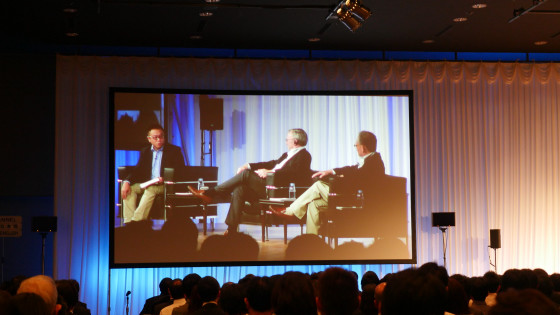
Eric Schmidt:
Hippo is a very dangerous animal for the company. People who earn the highest salaries tend to place importance on opinions as well, but we should listen to opinions from various people at the conference. Normally, two to three men speak at a conference of American companies and women do not speak much, but people who do not speak may have the most interesting opinions. We should set up an environment where people like to hear opinions.
Also, in books you should also be aware of those who lie, who wrote "naive".
Koyanagi Koyanagi
Does anyone on Google make a certain person turn into a nabe?
Eric Schmidt:
Of course, there is. In that case, I will talk to the surrounding people such as friends. Some people do not realize that their actions have a bad influence, so it may be solved by having friends contact you rather than managers.
I believe that productivity will be improved if I am packed in a narrow place basically including communication aspects. Also, I think that the desk is also lying on it personally.
Koyanagi Koyanagi
Is it statistical?
Eric Schmidt:
I do not know whether it is statistically.

Ken Murakami:
I think that it is better to have a messy desk. A beautiful desk is a desk I feel like going crazy (lol)
Koyanagi Koyanagi
Well then, I would like Eric to go through a final summary around here. How do I get closer to smart creatives?
Eric Schmidt:
New ideas always exist. And people can create new ideas or get acquainted with otherwise. I have been very fortunate to be involved with people who create new ideas. Energy is infected. It is important to get acquainted with such people.
Koyanagi Koyanagi
I do not know what kind of people here are gathering, but what I would like to say to elderly people is "Please trust the people of the younger generation". When you were 30 years old, you thought that you had a better idea than the old people do not you? The younger generation should be thinking the same thing. To make them do what they want to do, and to keep having their excited feelings. And let the young generation be confident with anxiety, be able to realize with ideas as words.
Koyanagi Koyanagi
I would like to take a question and answer session.
Question:
When trying to create a Google-like organization, what are the things you should and should not do? Also, what is important in making new companies from 1 in Japan?
Eric Schmidt:
The important thing when making a company is to make a vision. If there is an impact on it, people will follow.
Ken Murakami:
What is important to change the classic business in Japan is to recognize how important IT is. And those who are in their 50s who are not familiar with IT, those thinking about the world after retiring from retirement have said that "you should set your mouth anyway" (laugh). If you do not understand IT, leave it to young people.

Question:
Due to the attitude that we want to improve the world, Google has made everything open to the public. What I would like to ask is, when I make it open source, it is whether I calculate earnings in advance and open it. Or are they doing just to make the world better?
Eric Schmidt:
The open source method is often used on Google, but most of it is targeted at the platform. By making the platform open, many people will strengthen, so we use an enhanced platform and earn revenue elsewhere.
Question:
The budget is restricted and the rules of evaluation are also very strict, and the evaluation of individuals is a very difficult place. How should we evaluate to advance creatives?
Eric Schmidt:
As a team, the team knows who is doing the best job and who is useless. Anyway, it is important to listen to the team members.

Question:
In the book, I had a sentence saying "I should have coached earlier," but what was the big change that took with my coach?
Eric Schmidt:
I did not have a coach at first. I thought that I should not have a coach, and answered "Do you have a coach for tennis?" "There are coins in football?" "There are coaches?" "No need for you?" I also did (laugh). However, I met with Bill Campbell and learned that if I had a coach, that is a coach, I could work more effectively. Who can consult the difficult problem is important. I think that I should put on a coach now.
Question:
What do you think about working at home?
Eric Schmidt:
There was a time when the opinion that "You can work at home even if you are at home" is being popular, but this is very bad thing. Creativity is born from an innocent conversation. Of course there are exceptions, but I think that working at home is not a good idea as a general rule.

The situation of the day can be confirmed from the following movie.
[November 4] Google Eric Schmidt's "Internet Future and How We Work" - YouTube
In addition, the book "How Google Works (How - Google Works) - our way of working and management" which became the center of this event can be purchased from Amazon from 1944 yen including tax.
Amazon.co.jp: How Google Works - How We Work and Management: Eric Schmidt, Jonathan Rosenberg, Alan Eagle, Larry Page, Nami Hijikata: Books

Related Posts:
in Coverage, Posted by darkhorse_log

